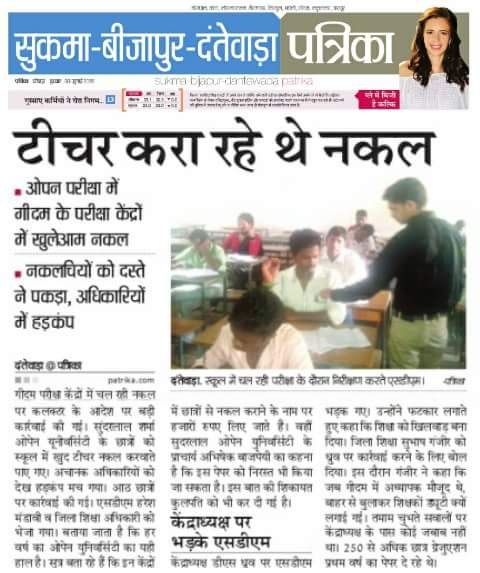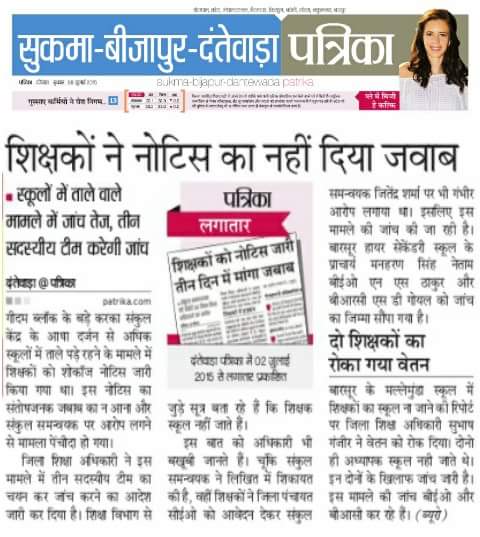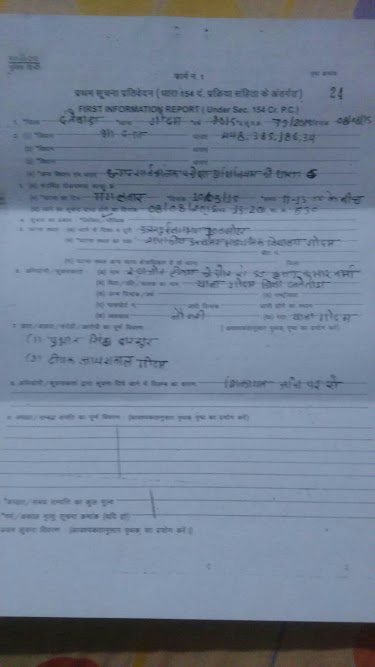
‘…and then it was time to meet and we entered the private meeting room of the prime minister. Dressed in a crisp white churidar-kurta pajama, Narendra Modi met us enthusiastically. With "What news, Pandit (Prashant Mishra)," he asked how we were with a smile in his old familiar style’ (May 10, 2015, Dainik Jagran). There was a particular type of informality in the above conversation between the Indian prime minister and Prashant Mishra (senior journalist) of Dainik Jagran (India’s leading daily).
Between the journalists who follow politicians for years and the politicians themselves, an informality often develops in addressing each other; they likely have nicknames for each other. Without commenting on anyone’s allegiance, it is unusual for a prime minister to call a journalist a ‘pandit’. It is possible that addressing him in this fashion is one way of acknowledging his wisdom. But why does wisdom always have to be equated with ‘pandit’? Incidentally, the prime minister did not address Rajkishore, who had accompanied Prashant Mishra, as ‘pandit’. It is also interesting that the leading daily had no qualms about reporting the matter of a national leader addressing a journalist as ‘pandit’.
In journalism it is easy to be a ‘pandit’. When addressing someone as ‘pandit’, not only is one praising their experience, one is also giving their caste due respect. Will an equally experienced and veteran Dalit journalist or one from a ‘other backward class’ be called a ‘pandit’? Will a learned and leading woman journalist be called a pandit?
Through my years of experience, I have seen a special caste-centric relationship develop between journalists, politicians and officials. If one were to study the nicknames among them, one would quickly see how useful caste titles are. I am not arguing that only caste titles are useful. Most relationships are professional, but one cannot deny that ‘baba’, ‘Panditji’, ‘Shuklaji’, Mishraji’, ‘Tiwariji’, ‘Singh saab’, ‘Thakur saab’, ‘Matha’ (short for respected Thakur), ‘filam’ (which means to be of the same ‘paant’; in caste relations, that which is ‘paant’ is ‘filam’) are often heard. In the run-up to the Lok Sabha election, there was a much debated interview with a person associated with the army (who went on to become a minister). That interview generated a lot of discussion among journalists about the caste of the interviewer and the interviewee. Irrespective of the reality, the caste of the two persons involved was an important aspect of the discussion that ensued. Journalists who commented on this recognized that in our profession caste identity is a crucial anchor for professional relationships. Such ‘natural’ relationships are also formed between journalists and politicians belonging to ‘other backward classes’. Similarly, there are relationships based on regional identity (‘Mallu’, ‘Gujju’, ‘Mullah’ etc.). Everyone learns to operate in the midst of all these identities.
Of course, this does not mean that no one has a problem with such identities or relationships. From my own experience, I can say that unlike the ease with which journalists from the ‘so-called’ upper caste flaunt their surnames, those from Dalit or OBC backgrounds feel burdened by their surnames to the same degree. They worry and are always alert about being taunted for their caste identity. This is so because in the newsroom, apart from the class quota, what matters is the upper caste quota. I say class because ‘they’ have degrees from good colleges, a ‘good’ address, a flourishing social network in the form of family members being positioned in influential posts. They come from the upper classes, but their class accomplishments are built on the foundation of their upper caste-ness. That is perhaps why journalists from such a background do not give their caste much thought or importance. They easily and conveniently forget that social networks have played an important role in their journey. Their class journey began with a caste advantage, and even today, their class journey (perhaps unrecognized by them) feeds off the caste based networking.
News anchors in India are often seen wearing rings on their fingers, necklaces and amulets given by some ‘Bengali babas’. Many news anchors (English and Hindi) can be seen with such aids. They look incredibly honest when adorned with these they conduct debates against blind faith. Some reporters face the camera with a red thread tied on their wrist or their forehead adorned with a red ‘tilak’ on Tuesdays. Those who feel embarrassed may place the red mark on their neck, just above the shirt collar, rather than the forehead. The forehead is that place where science wins over blind faith because you have to apply your make-up on the basis of the camera lights. While covering the Kumbh mela or other religious occasions, those priests and sadhus with whom I remain in touch, upon seeing me (and my forehead) on television, send me messages stating that Mangal’s or Shukra’s bad influence has been weakened!
Recently, when I wrote a critical story about the Chinese Goddess Quaunyin, I thought that the priest would be upset. Rather, he was so happy that he sent me a photographic message on WhatsApp to say that he had asked Mother Quaunyin to bless me. I didn’t even have to go there like Prime Minister Modi. From the newsroom to society, a caste conclave rules, which people call ‘upper caste mentality’. I call this a caste conclave because even those who do not belong to the upper castes fall prey to it. In this arrangement, only that which the upper castes (who have made the successful journey to the upper classes) decide or desire will happen.
Sansad Marg on April 14, 2015: Shannon, a young student of journalism, came running towards me. I thought she was approaching me for a selfie, but she wanted to show me a selfie of my profession. She asked a question that had troubled her all morning. ‘Why isn’t Dr. Bhimrao Ambedkar on television screens and in the newspapers?’ The media routinely broadcast images of festivals and anniversaries, but when it comes to Babasaheb there is a blackout. Shannon’s question actually hints at a larger concern from which we have insulated ourselves, the one I mentioned earlier. Though Shannon was smiling, she was also angry. She kept stating, ‘There is such a massive crowd on Sansad Marg, but absolutely no coverage of the event. Even when there are only a few people protesting at Jantar Mantar, the media is there to cover of the issue.’ I could have answered her, but my response would have sounded (and rightly so) hollow.
Instead, I asked Shannon why Babasaheb Ambedkar mattered so much to her. I was intrigued that a student of journalism would be so interested in the Ambedkar mela on Sansad Marg. My question made her eyes moist. ‘Sir I am what I am because of Babasaheb. But for him I would not have had this iPhone in my hand. I would have been nothing.’ The phone was an expensive one. Shannon spoke impeccable English. She is a young, modern woman, an English-speaker brimming with confidence. In spite of these accomplishments, her loneliness was palpable. For the world, her identity as a Dalit woman trumped all other accomplishments.
Perhaps Ambedkar would not have been mentioned at all had it not been for a BJP rally in Patna. For political parties, Ambedkar Jayanti constitutes an opportunity. But for a large section of Indian society, Ambedkar Jayanti is a cultural festival as well. Just like some sections celebrate Bhagwati jagran or Sai Sandhya, Ambedkar Jayanti is a cultural celebration which manages no coverage in the media. This year it only made the news because a Dalit was beaten to death in Maharashtra as the ring tone on his mobile phone played a song dedicated to Ambedkar.
While shooting for Prime Time on Sansad Marg, many people had asked me the same question that Shannon had posed. Each person there had become something in his/her life – an IAS officer, a revenue official, a doctor or a banker. However, no one talks about the Dalit middle class. Despite its size, its very existence is denied. In Mumbai, a senior Dalit official working with a public sector undertaking, lives in the PSU residential colony with a young child. The child is forced to spend his birthday alone as no one in the colony is willing to celebrate with him. Today, in spite of their status – English speaking and moneyed – the Dalit middle class is in search of recognition which society and the media has denied.
It is a politically savvy class. Unsurprisingly, even before I can ask any questions, they want to know why no news channel has ever covered Ambedkar Jayanti. ‘Will it actually be broadcast or are you only shooting this,’ they asked cynically. Some people even became aggressive while asking such questions. By ignoring certain questions and issues, the media helps create such restlessness – ask any Dalit middle class person and the anger is immediately palpable. The middle class cultural hegemony of the media has meant that various fasts such as Karva Chauth, Lohri and even Dhan Laxmi are written and talked about, but there is a deafening silence around Ambedkar Jayanti, Valmiki Jayanti or Ravidas Jayanti.
There are no Dalits in the newsroom. This has been revealed through numerous surveys. Yet there is little discussion on what might be a solution to this problem. If everyone makes it the newsroom based only on merit and chance, then surely some Dalits should also have made it. There is a serious lack of diversity in the media. Perhaps that is why the media sometimes ends up taking a stand against diversity. It begins to see all answers in one leader and his/her leadership.
It is unlikely that there is as much spontaneous celebration of any political leader as there is on Ambedkar Jayanti. It is not a day of boring speeches, but of celebration. On Sansad Marg, some were selling Ambedkar statues while others were busy providing free food to the visitors. Some were selling cool drinks while others were buying little statues of Ambedkar to dangle from their car dashboard (as others do of Sai Baba or Ganesh).
Many had queued up since the crack of dawn in order to enter Sansad Bhawan to garland Ambedkar’s statue. Others were fulfilling their lifelong dream of coming to Delhi to participate in the Ambedkar Jayanti festival on Sansad Marg. Remember, this is an area where the offices of the largest news agencies, as also Doordarshan and Akashvani broadcasting centres, are located. No wonder, so many people who had come to participate asked why Ambedkar Jayanti is neglected. Some people were overcome with emotion when they asked this question. I was also surprised how this could have happened. And even if, as an exception, some news channel did telecast it, the lack of media attention hurt those attending the fair.
I wondered if the media has the power to marginalize such a large section of society. Is it really true that the pain of the Dalits at being marginalized runs so deep? Shouldn’t the media be answerable for the blatant neglect of Ambedkar Jayanti, especially in comparison to other celebrations? Why did the woman revenue officer who had come in her official vehicle with her son need to repeatedly ask me, with disbelief, whether the programme would indeed be telecast?
Perhaps it is for this reason that after the Ambedkar Jayanti episode of prime time, I began to receive invitations from various Dalit groups who wanted to felicitate me. Even though I politely refused, the sadness in their voices remained with me. It is the loneliness of that part of our society which, despite political clout and not being economically depressed, remains. At least they have the means and ability to complain. For the Adivasis even this small opening does not exist, as mainstream media only remembers them in the context of Naxal violence. The India portrayed by media is so ekaangi, one-sided. It is not as if mainstream media does not report on atrocities and violence against Dalits. But beyond the formality of reporting such incidents, it does not push the agenda to give it the form of a campaign, nor does it participate directly in such campaigns. Such issues do not trend on social media such as Twitter and Facebook.
Given this context, it is no surprise that I began to get messages after the Ambedkar Jayanti episode. I counted more than 500 messages on Twitter, Facebook, email, and WhatsApp. However, only three non-Dalits wrote. The day the programme was telecast, no non-Dalit wrote. Generally, I get about 50 messages. On April 14, I only got messages from Dalit viewers. So do our viewers also behave like our media?
For many days the general secretary of the All India Confederation of SC/ST Organizations, Mr. Choudhary, kept calling my office to talk to me after which he wrote a letter: ‘This is the first time in history that media rose above caste-based discrimination to show a detailed report of the various celebrations of Ambedkar Jayanti. By broadcasting a one-hour programme on NDTV India, you have proven that you are completely different from other Indian print and electronic media which is trapped in a casteist mindset. For your progressive thinking, the followers of Ambedkar in India and abroad are indebted to you.’
I have created no history. But in the hearts of those for whom Dr. Ambedkar is ‘Babasaheb’, that one show has made history. Their loneliness and feeling of marginalization is apparent from their messages of gratitude. In the midst of this, my own caste became the topic of discussion on Facebook – What caste does this Ravish Kumar belong to that he shows programmes on Dalit issues? Is he Dalit? Some people even abused me. Why don’t these people ask about the caste identity of those who cover Karva Chauth or whose tilak-adorned foreheads and bodies bathed in the waters of the Ganga cover the Kumbh mela for weeks. Why does my caste become an issue when I do a show on Ambedkar? So much so that even in the Central Hall of Parliament, a Dalit MP asked my political editor whether I was a Dalit. Even some Dalit scholars and friends enquired about my caste.
Why do the norms of the caste conclave feel threatened when a Dalit issue is covered? Ambedkar is the country’s most potent political brand, but in the media there is not even an inch of space for him. How can there be such a disconnect between society, politics and the media? And why does this disconnect manifest itself only when it comes to Ambedkar? If one wants any proof that our media is casteist, then all one needs to do is investigate who it excludes.
(The article has been reproduced from http://www.india-seminar.com/2015/672/672_ravish_kumar.htm with the grateful permission of the publisher, Malavika Singh)
.jpg)




.jpg)


